John K. Culver and Sarah Kirchberger
The lessons that Washington and Beijing appear to be learning from Russia’s February 2022 invasion of Ukraine, and from Ukraine’s resistance and counteroffensive, could set the stage for a crisis over Taiwan in the next few years. This grim prospect is driven by the United States and China arraying themselves for a strategic rivalry since 2017 through the continuing trade war, economic decoupling, and increasing rhetorical and military positioning for confrontation over Taiwan. In light of the Chinese military’s threatening gestures, belligerent rhetoric, and other recent actions that read like they could be preparation for war, there is a danger that the successive warnings by senior US military commanders that Chinese CCP General Secretary and President Xi Jinping has already decided to use military force in the near term could become the proverbial tail wagging the dog — and could impose a logic that makes a US-China war more likely, rather than enhancing deterrence.1 Therefore, the key question for the United States and its allies is how an increasingly truculent and belligerent Chinese leadership can be incentivized to walk back from the brink. This paper examines what lessons China, the United States, and European allies have drawn from the Ukraine conflict and how such lessons have shaped these actors’ strategic assumptions. It concludes with a discussion of policy recommendations for the transatlantic community confronting the possibility of a US-China conflict over Taiwan.
China’s assumptions and lessons learned
Even as Beijing modulates its public statements in support of Moscow, China’s strategic assumptions from before the Ukraine invasion likely have not changed, and may depend on the longer-term outcome in Ukraine. That includes the prospect of an outcome that Vladimir Putin can claim as a Russian “victory,” in which Russia continues to hold territory and forecloses Ukraine’s NATO or European Union (EU) integration.
China is likely to apply the following strategic assumptions as it digests lessons learned from the Ukraine war.
According to Beijing, the United States is an adversarial, declining hegemony that will be antagonistic to China’s rise for the foreseeable future, and which will seek to foment instability within China and hostility on its periphery. In Beijing’s view, US antagonism to China is now structural and bipartisan. China’s previous self-imposed restraint, as it chose to prioritize stable US relations and drive economic reform and growth, is therefore moribund. For the Chinese Communist Party (CCP), the relatively peaceful global and regional environment that prevailed in the late bipolar Cold War and the post-Cold War period is severely challenged, as Xi told President Joe Biden in their March 18 call.“2 Economic growth and rising prosperity are still important, but diminishing, sources of regime legitimacy. Defense of the CCP system, fueled by nationalism, expanded party control, while more active cooperation with Russia and other US adversaries, such as Iran, is becoming more prominent. Xi made this explicit in his speech to China’s National People’s Congress on March 6: “Western countries led by the United States have implemented all-around containment, encirclement and suppression of China, which has brought unprecedented severe challenges to our country’s development.”3
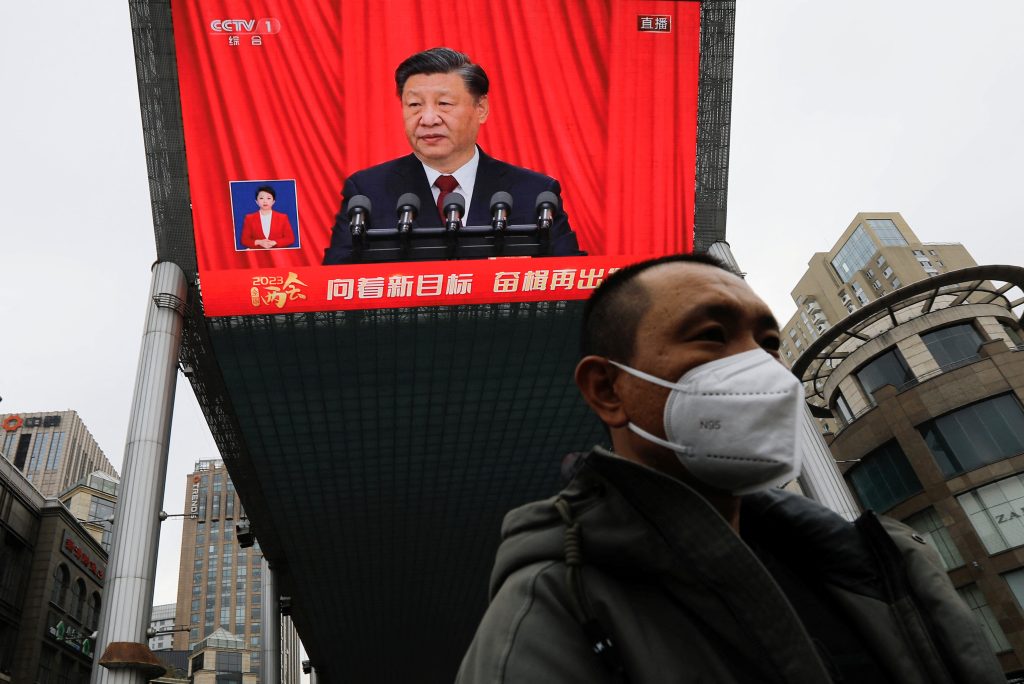
Economic growth and rising prosperity are still important, but diminishing, sources of regime legitimacy.
Giant screen displays a live broadcast of Chinese President Xi Jinping delivering a speech during the closing ceremony of the National People’s Congress (NPC), in Beijing. (Tingshu Wang via Reuters)
Another key view in Beijing is that Russia is China’s strategic partner. This status was further elevated on the eve of Russia’s invasion of Ukraine, when Russian President Putin and Xi met in Beijing and signed a joint statement on February 4, 2022.“4 Throughout the war in Ukraine, China’s leaders have reiterated their stance, most recently during visits to Moscow by Xi and by China’s top foreign affairs official Wang Yi in early 2023.5 The two countries are unlikely to ever have a formal mutual-defense treaty, but intensified cooperation in many spheres—including military coordination, intelligence sharing, energy, and trade—will continue and even accelerate.6 Even before its invasion of Ukraine, Russia was the junior partner in the bilateral relationship, but Beijing has deep strategic interest in ensuring that Moscow—and Putin personally—remains a viable ally in blunting US power and coordinating at the United Nations. Most importantly, Beijing has a strategic need to keep Russia from internal turmoil or international setbacks that could result in the rise of a regime that is hostile to China. One of the greatest gifts to Beijing of the Sino-Russian rapprochement that started during the 1990s, and truly took off from the mid-2000s, was a passive 4,200-kilometer border that enabled China to focus military modernization on naval, rather than land, warfare for potential conflict with the United States and Japan over Taiwan, or with India or Vietnam over border and maritime sovereignty disputes, respectively. The fact that Russia had dared to commit an estimated 97 percent of its entire forces to the fight in Ukraine by mid-February 2023 and, thus, baring its far-eastern borders, is a testament to this.7
Third, in the view of China’s leadership, the EU can act as a Western counterweight to perceived US hostility to China, and Beijing has at times tweaked its approach when deemed necessary to try to stabilize its ties to Europe. The EU lacked unanimity about following Washington’s lead, or did so only slowly and with less intensity, on hostile trade action and efforts to isolate China internationally prior to Russia’s invasion. In late April, inflammatory comments from China’s ambassador to France Lu Shaye, who essentially denied the sovereignty of former Baltic states, sparked an outcry across Europe and beyond.8 Shortly thereafter, Xi held his long-awaited call with Ukrainian President Zelenskyy,9 and separately, the Chinese Government voted in favor of a UN resolution containing language that explicitly acknowledges “the aggression by the Russian Federation against Ukraine,” a sharp departure from Beijing’s previous neutral UN voting patterns on Ukraine.10 While these moves are largely symbolic and mark a slight tactical rather than a strategic shift, they underscore Beijing’s willingness to make adjustments to try to maintain favorable relations with Europe, given the value Chinese leaders place on the region as a counterbalance to the United States.
However, China’s refusal to condemn the war against Ukraine and its enabling stance toward Russia have galvanized worries, particularly in Eastern European countries, over the trustworthiness of the Chinese government.11 On January 30, Czechia’s president-elect made it a point to accept a phone call from Taiwan’s President Tsai Ing-Wen, in a stark departure from previous practice.12 US intelligence made public in February 2023 that China was considering lethal arms supplies to Russia, causing grave concern in European capitals.13 Should Beijing actually deliver arms or ammunition to Russia despite its assurances to the contrary, China’s relations with much of Europe could be stretched past the breaking point and, indeed, there are signs of worsening strain, such as the aforementioned call between the Czech president-elect and President Tsai and his intention to plan a personal meeting with her, an unprecedented step from any Western leader; the withdrawal of the Baltic states from the Chinese 17+1 format; and, following similar decisions by many other European countries, Germany’s decision after long hesitation to finally ban and remove key components delivered by Chinese telecoms firms Huawei and ZTE from its fifth-generation (5G) network.14 At the same time, German leaders have continued to reach out diplomatically to China in the hopes of avoiding a complete Cold War-style economic decoupling scenario. On the other hand, European Commission President Ursula von der Leyen’s March 30, 2023, speech on EU relations with China put the future of the shelved Comprehensive Agreement on Investment (CAI) firmly in doubt.15
How the CCP and the People’s Liberation Army (PLA) ultimately digest strategic lessons from Russia’s war on Ukraine, therefore, will depend on that conflict’s course, the longer-term effects of Western sanctions on Russia and the global economy, and myriad other aspects, including elections in the United States and Taiwan in 2024.
Beijing has deep strategic interest in ensuring that Moscow—and Putin personally—remains a viable ally in blunting US power.
Vladimir Putin and President of the People’s Republic of China Xi Jinping made statements for the media following the Russian-Chinese talks on March 21, 2023. (Mikhail Tereshenko, TASS via Russian Presidential Press and Information Office)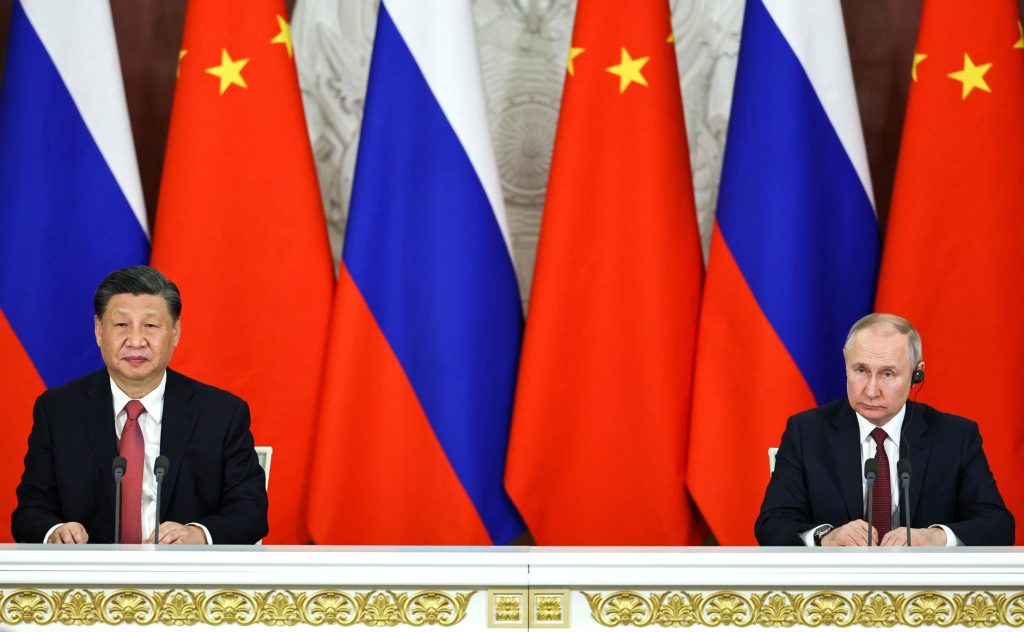

Beijing likely is also watching closely to see how deeply entrenched in—or distracted by—the Ukraine conflict the United States becomes, where it contributes the lion’s share of direct military aid, including key munitions and weapons platforms that are in short supply; Ukraine is currently expending US annual production of nine thousand HIMARS missiles every two months.16 As Russia continues to achieve reduced war aims in the east and south, the war seems likely to continue for the foreseeable future. It presents new opportunities for fissures in the Alliance, and reduced US strategic standing headed into US presidential elections in 2024 that are likely to be even more disruptive than previous election campaigns after former US President Donald Trump’s March 30 grand-jury indictment on business-fraud charges.17 Partly because of Washington’s massive arms support for Ukraine, its deliveries of key weapons and munitions already sold to Taiwan have been significantly delayed.18
But one momentous strategic implication of Russia’s invasion is probably already clear to Xi and the CCP. For the first time since the end of the Cold War, the prospect of major-power military conflict, and even nuclear-weapons use, is again a characteristic of the global order. Russia’s gamble in Ukraine that it could quickly defeat a non-NATO European neighbor and secure its near abroad has so far failed, but US-led Western unity and imposition of sanctions against Moscow have the earmarks of a protracted conflict that could drive new instability. If Beijing concludes that this is a characteristic of geopolitics and great-power competition in the twenty-first century, it could increase Chinese preparations for military conflict in Asia with either the United States or its proxies.
The deepening enmity of US-China strategic rivalry since 2017 has already eroded core CCP assumptions that competition would remain bounded by nuclear deterrence, deep economic integration, shared stewardship of financial stability, and cooperation on global challenges such as pandemics and climate. The Western reaction to the Russian war against Ukraine is likely to reinforce these judgments, and may be amplifying Beijing’s assessment that the United States is on a trajectory to pursue overthrow of the CCP as a strategic goal.
Even China’s February 24 “Position on the Political Settlement of the Ukraine Crisis” seemingly centers most around its affirmation of “sovereignty” as the key thing to be respected—crucially, without ever mentioning Ukraine’s sovereignty in particular, nor calling Russia’s invasion of Ukrainian sovereign territory an invasion, let alone illegal, despite this being a peace template for the Ukraine war.19 This implies the text has more to do with reaffirming China’s position on Taiwan and offering support to Russia than being an actual attempt to mediate. In calling to freeze the conflict, it would cement Russian territorial gains; ending the “unilateral” sanctions would again benefit Russia; and “promoting post-conflict reconstruction” would presumably benefit Chinese infrastructure companies. Beijing’s proposal on its face seems decidedly tilted toward Moscow or self-serving goals.
US assumptions and lessons learned
While dealing with the Russian aggression against Ukraine, the US government has not reduced its attention on the strategic challenge posed by China. At the time of the invasion, the Biden administration was aggressively focused on continuing and expanding Trump-era strategic competition with China. Even as Washington openly warned of intelligence regarding Moscow’s intentions, it continued adversarial policies and alliance building directed at China. It has since announced multiple rounds of technology restrictions on Chinese companies, and signed the CHIPS and Science Act to revitalize US semiconductor leadership.20 Moreover, the president has personally eroded US strategic ambiguity on US military commitments to Taiwan—despite National Security Council (NSC) staff “clarifications” after each repeated instance that US policy has not, in fact, changed.
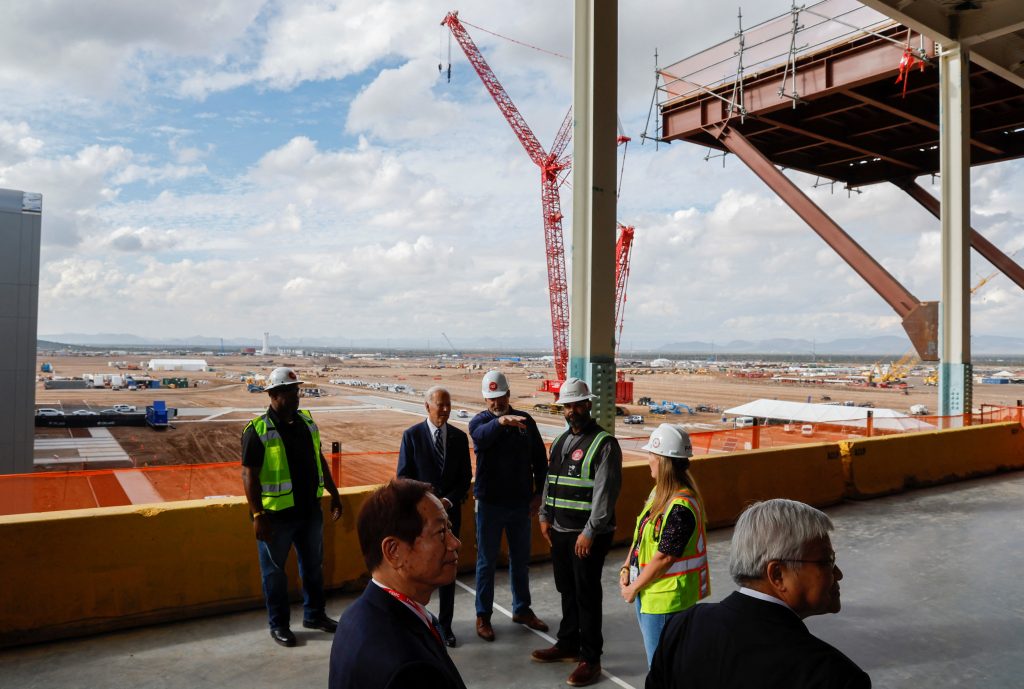
While dealing with the Russian aggression against Ukraine, the US government has not reduced its attention on the strategic challenge posed by China.
President Joe Biden talks to workers as CEO of TSMC C. C. Wei and Chairman of TSMC Mark Liu look on during a visit to TSMC AZ’s first Fab (Semiconductor Fabrication Plant) in P1A (Phase 1A), in Phoenix, Arizona. (REUTERS/Jonathan Ernst)
In its National Defense Strategy (NDS) released last year, the Biden administration focused on homeland defense challenges posed by Russia and China, rather than simply on military contingencies in the Indo-Pacific or Europe.21 This sends a strong message that the world is actively contested now, and that the Department of Defense and all of the US government are not just preparing for potential kinetic conflict, but engaged already in active operations to disadvantage China—tantamount to a new Cold War. Moreover, the NDS’ emphasis on “integrated deterrence” with allies and partners will underscore the threat to China of the United States designating Taiwan as a “key non-NATO ally,” potentially breaking existing US policy barriers to a virtual defense guarantee.
The United States is likely to apply the following lessons learned from the Ukraine war as it prepares for potential future conflict with China.
The United States sees public intelligence disclosures of Russian plans to invade Ukraine since November 2021 as a major success, despite failing to deter Russia or realize major pre-war Alliance (or Ukrainian government) preparation for the attack.22 The credibility that Washington gained when Russia invaded in February helped drive the immediate post-invasion international reaction (the reverse of the 2003 Iraq weapons of mass destruction (WMD) fiasco) and resulted in even more comprehensive sanctions than were threatened pre-invasion to deter Russia. Senior US military and administration warnings of Beijing’s “2027 plans” echo US intelligence warnings about Ukraine, albeit without the same specificity and high confidence.23
Similarly for the United States, a Russian military “paper tiger” perception can be applied to the PLA in a Taiwan scenario that draws on the usual tropes.“China hasn’t fought a major war since 1979” and, therefore, its military operational abilities may be more limited than expected.
“Amphibious invasion across 100NM Taiwan Strait is far more challenging than Russian land invasion of Eastern Ukraine,” due to the enormous inherent complexity of a Normandy-style amphibious landing and the PLA’s insufficient lift capacity for the task.
“Economic sanctions work, imposing a heavy burden for Moscow, thereby increasing regime insecurity, which can deter Beijing from taking action on Taiwan.”24
The key lesson Washington probably finds applicable to a Taiwan 2027 scenario is the importance of providing both conventional and non-conventional support, including intelligence sharing and equipment, in the runup to, and during, any conflict. In the case of Ukraine, Kyiv’s ability to blunt Moscow’s invasion was enabled by the strengthening of Ukraine’s resilience and resistance post-2014. While the United States and its NATO allies have not directly intervened in Ukraine, they maintain military equipment, intelligence, and economic/communications lifelines that have helped deny Russia its original war aims. Specifically, deliveries of new weapons (Javelin, Stingers, artillery/HIMARS, antiship missiles), near-real-time battlefield intelligence and targeting, and initial success in the public-relations/propaganda/information domain seemed to have blunted Russian hybrid warfare and aligned developed world/Global North opinion behind Ukraine and NATO. However, it is far from clear how well Taiwan could be resupplied in the event of a blockade, if at all. As an island nation, Taiwan has no cross-border sanctuaries for stockpiling and delivery of key military and civilian supplies. And while Russia has been restrained from striking NATO members on Ukraine’s western and southwestern borders, US bilateral allies in the Pacific have no NATO-like structure for collective defense.
A lesson the United States so far seems resistant to learning from Ukraine is that nuclear deterrence by the aggressor (Russia in the case of Ukraine, China in Taiwan) enables conventional war and blunts outside major-power intervention.25 The United States and its NATO allies are strongly united in resisting pressure from pundits to enforce a no-fly zone over Ukraine, break the Russian blockade of Ukraine’s Black Sea ports, or other ideas that could risk direct NATO-Russian war. China could very well conclude that inducing self-deterrence in Western capitals has worked well in Ukraine, and is a promising approach for Taiwan.26 On the other hand, nuclear deterrence works both ways. One could speculate how things would stand today had Ukraine been given a security guarantee akin to NATO’s Article Five in time, and whether this would not have effectively deterred a Russian attack.27 When President Biden conversely ruled out military intervention on behalf of Ukraine during the lead-up to the attack, deterrence was arguably weakened rather than strengthened. Rather than appreciating the transparency and reliability displayed by the United States, and accepting the olive branch it represents, an authoritarian aggressor might see preemptive self-constraint as a weakness to be exploited.
The more the United States talks up the prospect of a 2027 Taiwan war scenario, the more it will turn to buttressing Taiwan’s “resilience”—regardless of whether Taiwan wants this, given the island’s failure to buttress its own defense during twenty-five years of rapid PLA modernization and growing tensions on the strait.28
The more the United States talks up the prospect of a 2027 Taiwan war scenario, the more it will turn to buttressing Taiwan’s “resilience”—regardless of whether Taiwan wants this
US Senate Majority Leader Chuck Schumer (D-NY) announces that he will unveil a new package of legislation to address competition with China. (REUTERS via Craig Hudson)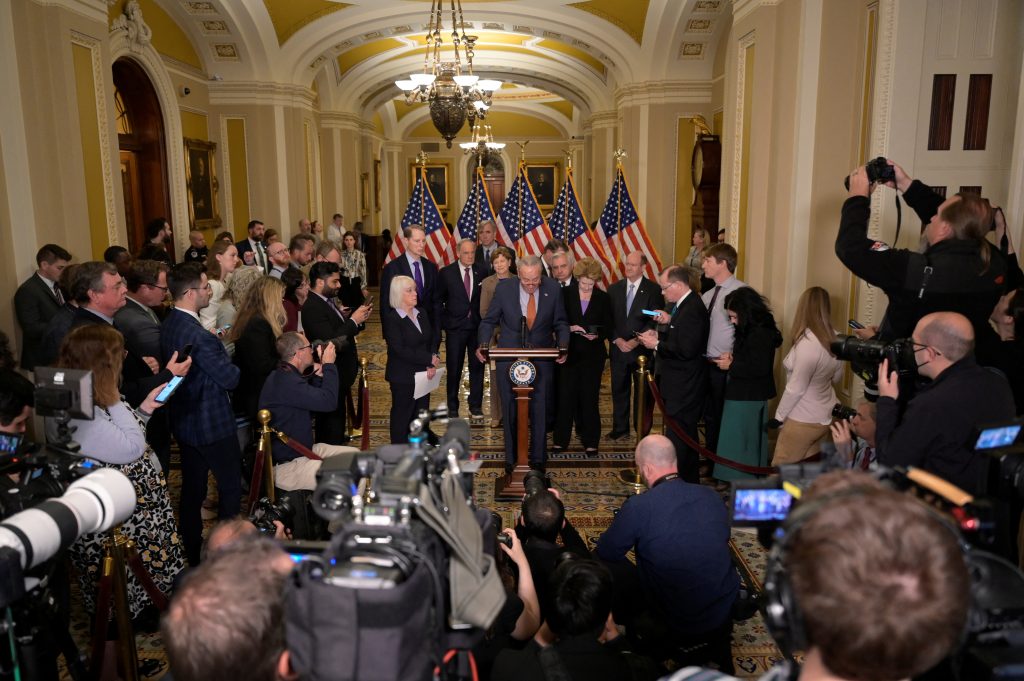

So far, the drumbeat in US media, from Congress, and among some members of the current administration is to be prepared for direct US military intervention to defend Taiwan from a Chinese military attack. The United States, and its allies and partners, should assume that China would be at least as determined as Russia to wield its rapidly expanding nuclear-capable forces (and space/counterspace and cyber capabilities) to deter direct US intervention. China has stated numerous times that it would be prepared to declare a state of war today if it saw Taipei, Washington, or Tokyo violate the understandings that have preserved the peace since at least 1979. The main potential triggers for this are: Chinese perceptions that Taiwan is moving irrevocably away from the possibility of unification and toward the founding of a new state under the moniker “Taiwan” at some future point; a renewed Taiwanese effort to acquire nuclear weapons; or a return to a quasi-formal US military-security relationship with Taiwan, including through stationing US forces on the island or integrating Taiwan into the US alliance sphere through actions such as inviting it to participate in regional or bilateral military exercises or in Alliance intelligence-sharing arrangements. At the same time, China itself through its threatening actions has been doing the most to upend the understandings that constituted the peaceful status quo in the Taiwan Strait, forcing Taiwan, other regional actors such as Japan, and the United States to reposition themselves.
Europe’s lessons learned
Europe as a whole—comprising not just the EU, but also the United Kingdom, Norway, and other key non-EU states—has rather divergent regional security cultures. Former Eastern Bloc countries, for instance, have been far more alert to the risks posed by a belligerent Russia than have Western European countries that have never been under Russian occupation. European lessons learned from the Ukraine war, therefore, differ markedly in each region. For countries with a traditional Russia-friendly outlook—in particular, Germany, France, and Austria—the Ukraine war came as a shock and was met with initial disbelief and disorientation, giving way to a painful process of finding a new security paradigm.29 Other countries—such as the Nordics, Baltics, and Central and Eastern European (CEE) countries—were not as surprised, and indeed felt vindicated after decades of open disregard for their warnings.30 With the exception of Finland, most European countries discovered that their previous strategies of reaping a “peace dividend” by shrinking the armed forces and neglecting societal preparedness for crises and war had backfired.31 Collectively, Europe has learned (or is learning) five primary lessons.32
First, a real effort to bolster collective defense through tangible capabilities was urgently required, after countries paid only lip service to NATO commitments (such as the pledge to commit 2 percent of gross domestic product (GDP) to defense spending). This includes the need to ramp up production of defense goods in support of Ukraine during what could be a long struggle.33
Second, Europe learned the dangers of energy dependence on Russia. Prior to the war, Germany had dismissed concerns voiced by its eastern neighbors, the United States, and especially Ukraine that Nord Stream 2 would make Germany dependent and vulnerable to coercion, while also massively weakening Ukraine’s geopolitical situation. These warnings were proven right and have led to a painful reorientation process in Germany (dubbed the “Zeitenwende”) that is still in full swing more than a year after the war started, and is far from concluded.34 Intense debates still surround the questions of rebuilding German military capability, lethal arms supplies for Ukraine, and the future orientation of Germany’s Russia policy. As Germany is a key member state of both the EU and NATO, due to its size and geographic location, its unresolved security-political identity crisis negatively impairs both these organizations, leading to impatience—particularly among the Eastern European states—and a diminished German stance.35
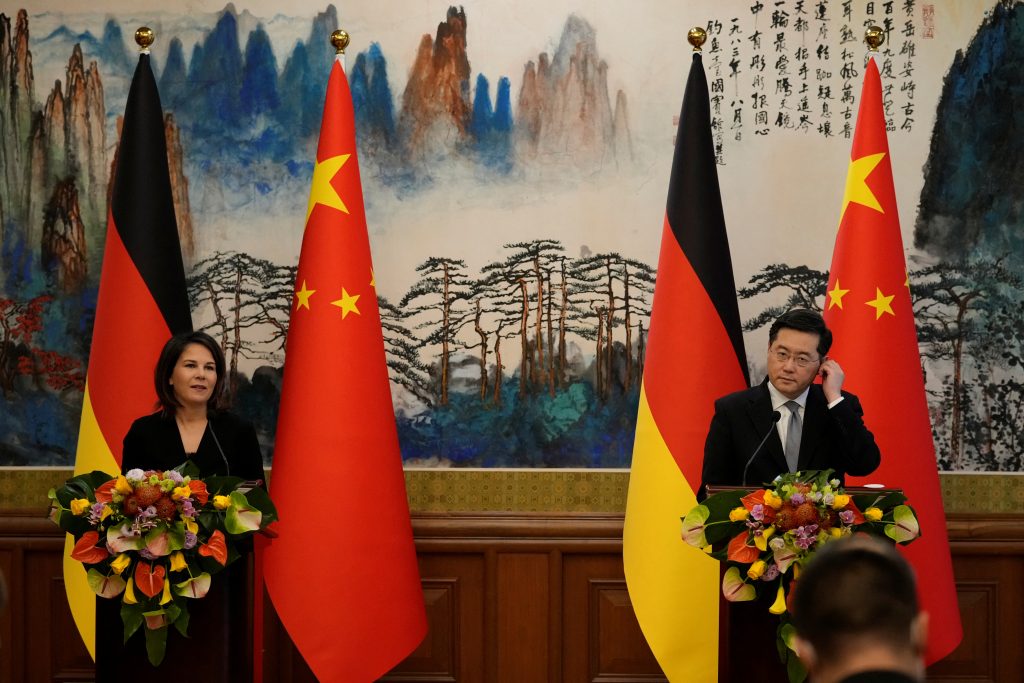
China’s dubious role in the Ukraine war definitely has the potential to make China “lose Europe,” even if China refrains from delivering arms and ammunition to Russia.
German Foreign Minister Annalena Baerbock and Chinese Foreign Minister Qin Gang attend a joint press conference at the Diaoyutai State Guesthouse in Beijing, China. (Suo Takekuma/Pool via REUTERS)
Third, Europe has recognized China’s apparent role in the Ukraine war as a covert supporter and enabler of the Russian aggressor, and the consequences this realization has for the security of critical infrastructures in Europe that were built with Chinese technology.36 Rather than supporting Ukraine and using its influence on Russia to stop the war, China has bolstered Russia diplomatically and economically, stopping just short of violating Western sanctions that would endanger China’s economy, while failing to condemn the invasion and effectively calling in its February 2023 “Position” for a freezing of the conflict that would reward Russia’s aggression with territorial gains.37 Particularly among the post-socialist EU and NATO member states in the Baltics and in CEE, this has led to intense distrust of China and disillusionment regarding the official EU formula of China as a “partner, competitor and rival” of the EU.38 The final outcome of this reevaluation will largely depend on China’s further actions of support for Russia—or its refraining from such support, as it may be. Against the backdrop of negative experiences with Chinese “wolf warrior diplomats” during the pandemic, and following coercive diplomacy, China’s dubious role in the Ukraine war definitely has the potential to make China “lose Europe,” even if China refrains from delivering arms and ammunition to Russia.39 Previous Chinese Foreign Minister Wang Yi’s hostile stance during the February 2023 Munich Security Conference, and a rather aggressive first speech by China’s new Foreign Minister Qin Gang, do not seem to offer much hope in this regard.40
Moreover, Europeans have come to realize that war over Taiwan could break out, despite the risk of nuclear escalation and despite the huge economic constraints in place, and regardless of the political risk such a war would pose to China’s leaders.41 Given Putin’s complete disregard for such constraints when following through with his attack plan, Europeans have had to accept that their assumptions about the economic rationale as a deterring factor in security-political decision-making of autocratic countries can no longer be relied upon, and that military forms of deterrence are ultimately more meaningful.42 The notion that China’s even greater degree of economic dependence on the outside world than Russia’s would serve as sufficient deterrent against military adventurism, therefore, might not hold. Consequently, there has been a palpable uptick in European analyses and discussions surrounding the risk of escalation in the Taiwan Strait, possible military and economic consequences, and Europe’s role in such a scenario, while exchanges with Western and South Pacific NATO partner states have markedly increased. French President Macron’s initiative during his early April 2023 China visit of implying that Taiwan is not Europe’s problem was quickly rebutted across European capitals, and Germany’s Foreign Minister Annalena Baerbock made it a point during her subsequent China visit to name war over Taiwan a “horror scenario” that would send “shock waves” around the world and deeply affect Europe.43
Finally, European countries in general, and NATO members in particular, have a newfound appreciation of the United States as the ultimate security provider for European NATO member states. Particularly in Germany and France, the realization that a European “strategic autonomy” remains a pipe dream for the foreseeable future due to lack of capabilities, and the fact that Ukraine’s defense effort would likely not be viable without massive US support, has been an unwelcome, yet necessary, reality check.44 Finland and Sweden’s applications for NATO accession are a testament to the indispensability of the nuclear umbrella provided by US forces to frontline NATO states. Russia’s decision to withdraw from the New Strategic Arms Reduction Treaty (New START), the nuclear blackmail it employed to keep Western countries from intervening on behalf of Ukraine, and China’s massive expansion of its nuclear arsenal all run counter to European hopes of creating effective arms-control regimes and working toward nuclear threat reduction.45 Six years after the International Campaign to Abolish Nuclear Weapons (ICAN) was awarded the Nobel Peace Prize, Europeans are needing to accept that there is currently no substitute for nuclear deterrence in the face of the Russian—and, potentially, the Chinese—threat, and that the global trend points toward more nuclear-armed states in the medium term rather than successful arms reduction.46 This also implies a newfound sense of European vulnerability to exposure, should the United States become tied down in a conflict with China. All in all, Europe is still reeling from the shock of the war and the challenge it poses to long-held assumptions of economic interdependence and institutionalism as the effective and civilized way to resolve conflicts. Regardless of the war’s ultimate outcome, it is already clear that its humanitarian, economic, political, and security consequences massively complicates the way European states will calibrate their exchanges with China going forward.
Implications of conflicting lessons for deterrence
The collision of these conflicting “lessons” could result in a deterrence trap. If the US increasingly acts on its conviction that China plans to attack on its own initiative in the next few years, the United States is likely to put enormous pressure on Taiwan to prepare to become the next Ukraine, and its self-imposed restraints on security assistance will further erode. US fear of a Chinese attack would increasingly drive a deepening cycle that is bound to cross at least some of China’s red lines.
Deterrence traps, of course, usually have more than one moving part; for its part, China’s actions drive this dangerous dynamic more strongly than those of the United States. China keeps moving the red lines, conducting increasingly provocative military operations around Taiwan, creating provocative situations (such as its “blockade drill” after Speaker Nancy Pelosi’s August 2022 visit to Taiwan, which included the unprecedented shooting of ballistic missiles over the island), and intensifying efforts to choke off Taiwan’s international breathing space.47 Honduras’ switch to China leaves Taipei with only thirteen formal diplomatic partners as of April 2023, demonstrating that Beijing’s “checkbook diplomacy” threatens to flip others soon and making Taipei more reliant on the United States, Japan, and the EU to prevent greater isolation. And, crucially, if war over Taiwan ever breaks out, it will have been because China chose to use lethal force against Taiwan for the first time since 1958, not the other way around.
Upping the military ante to some degree seems necessary as long as China is changing its military posture and behaving aggressively.
An F/A-18E Super Hornet flies over the flight deck of the Navy’s only forward-deployed aircraft carrier USS Ronald Reagan in the South China Sea. (US Navy)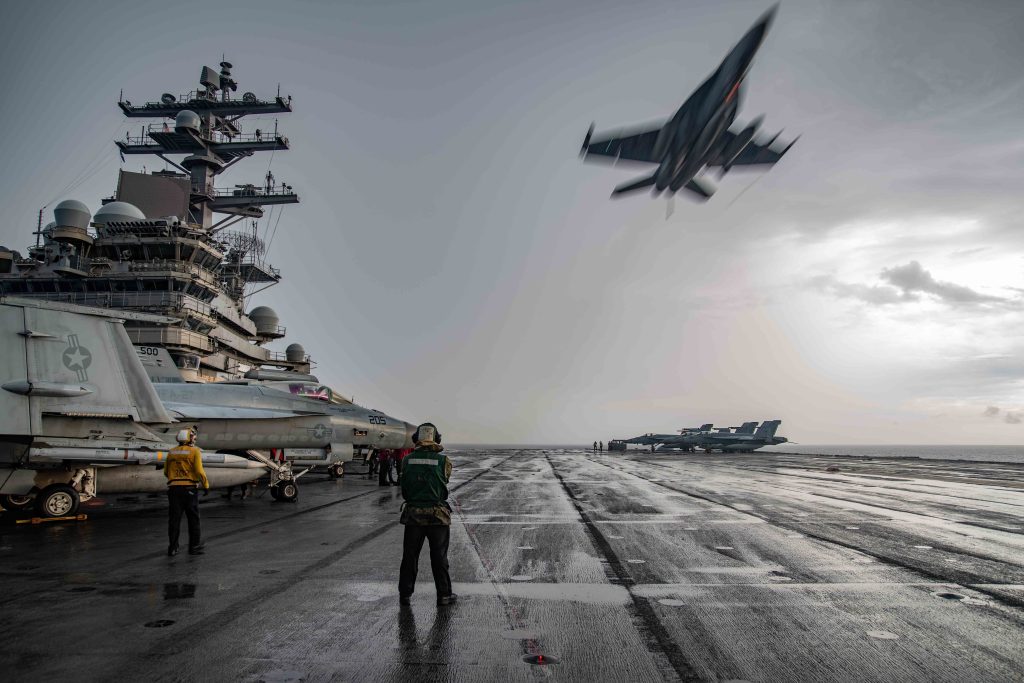

The key question, therefore, is what steps Washington, Taipei, and others can take to preserve a stable status quo without fueling tensions. Upping the military ante to some degree seems necessary as long as China is changing its military posture and behaving aggressively. The United States is far from alone in seeing a military threat from China, as that perception is shared within much of the region (including Japan, Australia, Vietnam, the Philippines etc.), and even Europeans are becoming increasingly worried, despite remaining relatively inattentive to the military details of China’s behavior.
The Ukraine war, therefore, offers all sides a chance to learn how such a situation can be avoided: signaling weakness and indecisiveness on the part of the West before February 24, in any case, was not helpful in avoiding the Ukraine war. In the case of China, there is no reason to assume that signaling weakness and indecisiveness will yield any better outcome. In other words, there is a chance to drive home to China the great risks of going to war, and to signal allied resolve in aiming to avoid a second scenario of the same type as that in Ukraine. However, the Ukraine example has limits when applied to Taiwan, where China’s decision to use force—either to convince Washington or Taipei to reverse actions that cross Beijing’s long-established “red lines” (formal independence, a US military alliance) or to compel unification—likely would not be as opportunistic, or as lacking in constructive strategic aims, as Moscow’s decision to invade Ukraine.
Policy recommendations
The collision of these conflicting “lessons” identified by the United States, China, and Europe could result in a deterrence trap, and China’s actions drive this dangerous dynamic more strongly than those of the United States. However, Washington, Taipei, Brussels, and others can still play important roles in preserving stability without fueling tensions.Allies must analyze, and urgently address, the reasons why deterrence failed in Ukraine. A key lesson to draw from the Ukraine war should be the realization that deterrence failed for a number of reasons, including naiveté and wishful thinking; a willingness among allies to make themselves overly dependent on Russian energy supplies; a lack of resolve in showing a unified front before aggression; and disregard for basic military preparedness among most of the allies.
Non-kinetic scenarios might be China’s favored option for subduing Taiwan, and could be difficult to effectively address as allies. In light of the military difficulties Russia is experiencing in Ukraine, which came as a surprise to the Chinese leadership, it can be assumed that China might prefer non-military or less decisive options of coercing Taiwan if at all possible, short of a PRC perception that Taiwan has taken actions tantamount to a declaration of independence or an explicit US defense commitment. Allies should wargame and prepare for such non-kinetic scenarios, including blockades, hybrid attacks, and subversion, because a less than clear-cut case of aggression might prove far more difficult to react to as united allies than a clearly attributable violation of the United Nations (UN) Charter as in the case of the Ukraine war.
Information warfare over Taiwan presents a key challenge for allies. Just like Russia, China is highly effective at using information and psychological warfare to its advantage. Likeminded countries in the transatlantic and Indo-Pacific communities should identify and address, in a timely fashion, any false narratives China is spreading to sow discord among them or to shape perceptions in the Global South that are detrimental to the goal of upholding the UN Charter and the principles of the rules-based international order.
“Anti-colonial” and “anti-hegemonial” self-justifying narratives by aggressor states targeting audiences in the Global South should be countered more effectively. China and Russia are jointly positioning themselves as “anti-hegemonial” champions of a multipolar world order and, in some cases, are successful despite the fact that Russia is fighting to regain a former colony, or that the PRC threatens war as it seeks “reunification” over Taiwan, which it has never controlled. Transatlantic allies should, therefore, make sure to correct this self-representation by publicly addressing China’s violations of its own 2013 Friendship and Cooperation Treaty with Ukraine, signed by Xi Jinping himself, in which China reinforced the security guarantee extended to Ukraine in recognition of its voluntary relinquishment of its nuclear arms via the Budapest Memorandum (Article 2); pledged to assist Ukraine in the protection of its territorial integrity (Article 5), promised not to take any action prejudicial to the sovereignty, security or territorial integrity of Ukraine (Article 6), and is bound to hold “urgent consultations” with Ukraine to develop measures to counter a threat in case of a crisis (Article 7).48 Despite China’s obligations under this treaty, Xi didn’t reach out to Zelenskyy until more than a year after the Russian invasion began.49 Ukraine, for its part, has always upheld its treaty obligations to China.50
Allies should not put too much hope in a “wedge” strategy. Though some political leaders still harbor hopes of driving a wedge between China and Russia, and incentivizing China to work against Russia, there is currently no reason to believe such an approach might yield viable results. Rather, based on recent Chinese leaders’ consistent actions and rhetoric, allies should assume that Beijing continues to share Russia’s strategic vision of challenging, and fundamentally revising, the international rules-based order (as laid out in their joint statement of February 4, 2022). China can, at best, be hindered from throwing its full weight behind Russia in this war, but not weaned from Russia as long as Xi Jinping is in power, due to the countries’ mutual synergies and shared geopolitical interests.51
Sharing intelligence can bolster credibility and unity among allies and beyond. The US strategy of sharing intelligence prior to the Ukraine war, and the accuracy of that intelligence, was highly effective in foiling a Russian surprise attack and bolstering US credibility among allies. This approach should also be continued with regard to China’s military actions in the Western Pacific. Care should be taken, however, not to repeat the mistake of sharing unreliable assessments, as in the infamous Iraq “weapons of mass destruction” analysis, which damaged US credibility in Europe at the time.
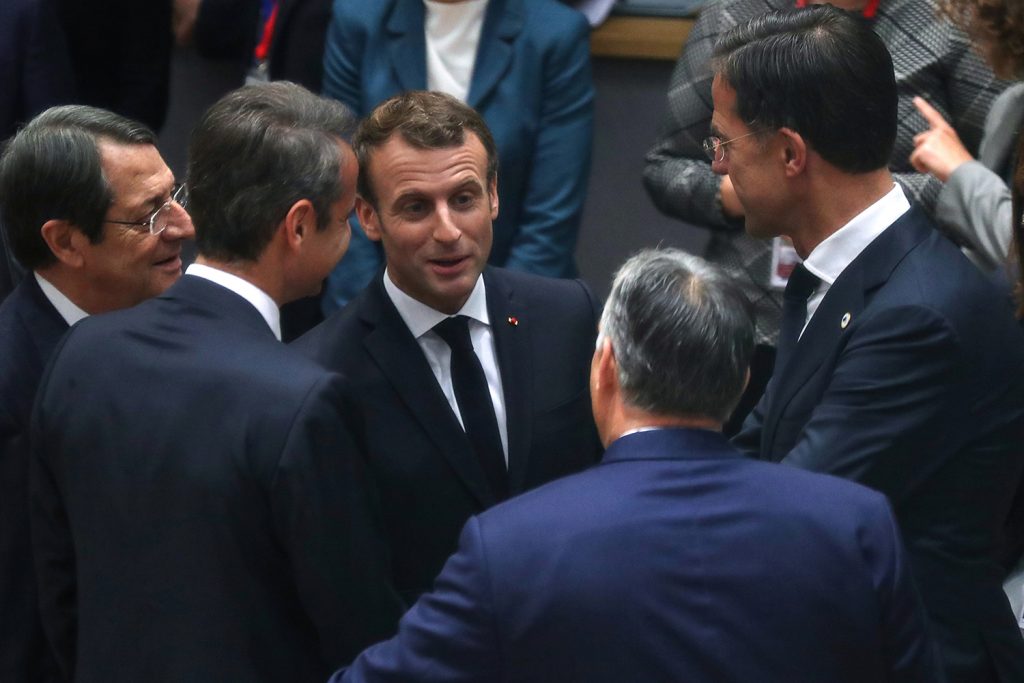
Although NATO is chiefly concerned with the European theater, its member states represent a sizeable share of global GDP, and the economic deterrence they can provide toward China is not to be discounted.
French President Emmanuel Macron talks to other European leaders during the second day of the European Union leaders summit in Brussels, Belgium October 18, 2019. (Aris Oikonomou/Pool via REUTERS)Frustrations notwithstanding, European allies make valuable contributions to security. From the US perspective, notwithstanding its predilection toward working with the United Kingdom and its existing frustrations with large EU and NATO partners Germany and France, Europe as a whole should not be discounted as a valuable security partner—including as a partner for routine engagement to better understand and track China’s capabilities and intent toward Taiwan in the military, economic, information, and political domains. In particular, the Nordic, Baltic, and many CEE states, and NATO as an organization, have proven capable of quickly drawing meaningful security-related conclusions from the Ukraine war. NATO accession by Finland, soon followed by Sweden’s, can be expected to improve NATO’s effectiveness as a whole, since at least Finland is going to be a net security provider—for instance, in a scenario of the Baltic states coming under threat. Although NATO is chiefly concerned with the European theater, its member states represent a sizeable share of global GDP, and the economic deterrence they can provide toward China is not to be discounted.
Conclusion
The lessons that Washington and Beijing appear to be learning from Russia’s February 2022 invasion of Ukraine and Ukraine’s resistance and counteroffensive, in terms of military effectiveness and deterrence, could set the stage for a crisis over Taiwan in the next few years if those lessons are not accompanied by simultaneous efforts to defuse tensions where that is possible. European allies, just like US allies in Asia, can—and should—play a key role in this. For that, it is necessary to think of Eastern Europe and the Western Pacific not as two distinct theaters, but as interlinked theaters where events in one will inevitably have repercussions in the other. In other words, despite the cost, supporting Ukraine is not a detraction from deterring China if it leads to an outcome in which Russian aggression is thwarted, as that also enhances deterrence regarding Taiwan. At the same time, when the United States is focusing more strongly on the Western Pacific, Europeans need to cease seeing this as “abandoning Europe,” and instead step up their own game to bolster the rules-based international order both at home and abroad, with the means at their disposal.
Understanding more closely why deterrence failed in Ukraine, and exploring how these lessons could be applied to enhancing deterrence, bolstering diplomatic initiatives, and, thereby, hopefully defusing tensions over Taiwan should be high on the agenda of the entire Alliance. After all, all members share the same interest, as does China: finding out how to avoid sleepwalking into a global war.
Acknowledgements
This publication was produced under the auspices of a project conducted in partnership with the Norwegian Ministry of Foreign Affairs focused on the impact of China on the transatlantic relationship.
John K. Culver is a nonresident senior fellow with the Atlantic Council’s Global China Hub and a former Central Intelligence Agency (CIA) senior intelligence officer with thirty-five years of experience as a leading analyst of East Asian affairs, including security, economic, and foreign-policy dimensions.
Previously as national intelligence officer for East Asia from 2015 to 2018, Culver drove the Intelligence Community’s support to top policymakers on East Asian issues and managed extensive relationships inside and outside government. He produced a large body of sophisticated, leading-edge analysis and mentored widely on analytic tradecraft. He also routinely represented the Intelligence Community to senior US policy, military, academic, private-sector and foreign-government audiences.
Culver is a recipient of the 2013 William L. Langer Award for extraordinary achievement in the CIA’s analytic mission. He was a member of the Senior Intelligence Service and CIA’s Senior Analytic Service. He was also awarded the Distinguished Career Intelligence Medal.
Dr. Sarah Kirchberger is a nonresident senior fellow with the Scowcroft Center for Strategy and Security. She serves as head of Asia-Pacific Strategy and Security at the Institute for Security Policy at Kiel University (ISPK) and vice president of the German Maritime Institute (DMI). Her current work focuses on maritime security in the Asia-Pacific region, emerging technologies in the maritime sphere, Russian–Chinese military-industrial relations, China’s arms industries, and China’s naval and space development.
Before joining ISPK she was assistant professor of contemporary China at the University of Hamburg, and previously worked as a naval analyst with shipbuilder TKMS Blohm + Voss. She is the author of Assessing China’s Naval Power: Technological Innovation, Economic Constraints, and Strategic Implications (2015). Her earlier work includes a monograph on informal institutions in the Chinese and Taiwanese political systems as well as studies of reform discourses within the Communist Party of China and of Mainland Chinese perceptions of Taiwan’s post-war transformation. She completed undergraduate and graduate studies in Sinology, Political Science and Archaeology in Hamburg, Taipei, and Trier and holds an MA and a PhD in Sinology from the University of Hamburg.
No comments:
Post a Comment